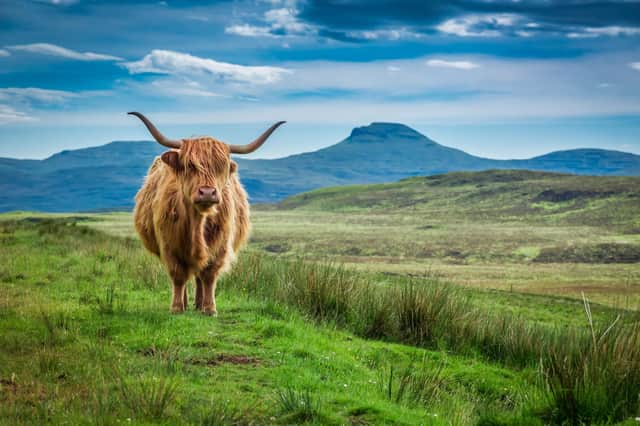Sustainable Scotland: Scottish farmers are facing financial pressure and skills shortages


Farmers in Scotland are showing enormous creativity to reshape their businesses for the future – despite huge financial pressures, skills shortages and a need to be green to secure funding.
Sustainable Scotland has learned about the rapidly rising cost of fuel, fertiliser and more, but also highlights great examples of innovation.
Fiona Smith of Westerton Farmers, near Laurencekirk, Aberdeenshire, describes how the farm supplies vegetables to the public via retail outlets The Spud Hut, which uses zero packaging and works on an honesty box-based system, and Farm to Table, while also selling malting barley to a grain merchant.
Farm to Table allows customers to refill their own containers to reduce packaging waste, and a 'rent and return' scheme for living, potted Christmas trees.
Richard Leslie, a Partner at law firm Shepherd and Wedderburn, says the UK and devolved Governments were examining new ways of paying farmers after Brexit.
“There's an environmental, sustainable element to future payments – linked to how farmers produce food, but also how they operate their farms in terms of lowering greenhouse gas emissions and dealing with carbon. Groups in various sectors – arable beef, dairy pigs, etc – are looking how each sector can best reduce their carbon footprints."
Hazel Anderson, a Senior Associate with Shepherd and Wedderburn who also lives on a farm with almost 200 suckler cows in Aberdeenshire, says farmers have sustainability in their blood.
"Most farms are passed successfully from one generation to the next. I think there's a difference between sustainability on an environmental basis, and from a business perspective. The change of the payments and subsidy regimes is perhaps trying to align the two to make sure people can still turn a profit whilst looking after the environment."
She says the farm has introduced a biomass heating system for farm cottages, leading to greater efficiency and fixed prices.
Fiona Smith says sustainability has been a massive focus for Westerton in recent years, with solar panels and a ground source heat pump added to dry cereal crops and heat the farm workshop and potato grading shed.
However, rising electricity prices had been a real challenge: “We had to find £800 a month for Farm to Table to sit still – it was scary numbers. But you have to adapt – we dried grain quicker, we had fewer potatoes in the cold store and we’re not planting as many potatoes next year."
Hazel Anderson also talks about soaring costs - of fertiliser and animal feed: "Pre-Ukranian war, we were probably looking at about £200 a tonne for fertiliser – then at one point it was £1000. We're still looking at 2-3 times what we were paying.
"Wheat markets are very volatile, so if you sell well, and plan, you can still make money. But there's a lot more time spent looking at graphs and stock markets to run your business."
Feed costs were another huge issue, she explains: "If you are fattening cattle for market, your feed costs will be through the roof. If you don't produce your own feed, you've got to buy it in and the costs are pretty alarming at times. Pigs and poultry are going through a particularly hard time."
Richard Leslie says skills shortages are another big problem for agriculture: "We have traditionally relied on seasonal workers to come in for soft fruit and for vegetable picking, and we just can't attract those workers.
"We also have an ageing farming population, so it's difficult to attract people who don't all want to do the hours farmers have to do.
"On seasonal workers, visa restrictions and the low value of the pound means people are taking their labour elsewhere in the European Union where they can take more money home. So some farmers have had to change their practices, and some fruit left to rot on the vine."
Despite all challenges, the speakers are optimistic about the future of rural Scotland.
“Farmers are an adaptable lot,” says Richard Leslie. “They're innovative and have great pride in what we produce in Scotland. Promoting local produce is important because of food security and food miles and we need to keep putting a premium on local provenance."
Hazel Anderson says the 2022 Scottish Agri-Tourism Conference was “a fantastic showcase of all brilliant ideas” and adds: “I spoke to people that converted cattle sheds into wedding venues, and shipping containers into lovely farm cafes.”
In conclusion, Anderson says: “When a farmer is motivated by wanting to create a future for his or her children, of course they're going to make it happen. Everyone pulls together and gets on with it. So there's a great future."
Fiona Smith has focused in recent years on business management at Westerton, but is now "my dad's right hand” to learn more about the physical side of running the farm, with a view to succession. At the same time, she is already thinking about the next generation: "My son Matthew is absolutely farming-daft at the moment, as I think most four-year-olds are.
"My plan is to create a business that doesn't necessarily need somebody to work in agriculture to take it forward – there's also a management aspect, and a retail aspect. We want to continue to be green and to reduce our carbon footprint – and also build up a business that can go down to the next generation."
Find out more at https://shepwedd.com/expertise/green-recovery